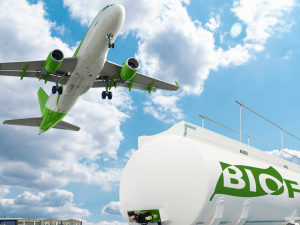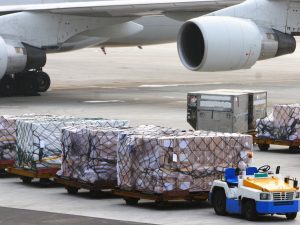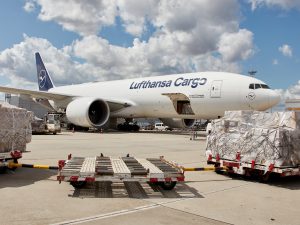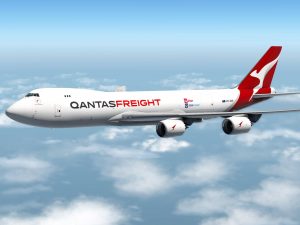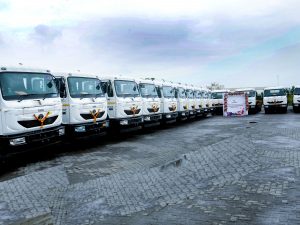The second edition of Arabian Cargo Awards 2024 concluded with industry captains clinching titles for their contribution. His Excellency Humaid Mohamed Ben Salem, Secretary General, Federation of UAE Chambers of Commerce & Industry, was the Chief Guest, while His Excellency Ahmed Algaizi, Assistant Secretary General, Federation of UAE Chambers of Commerce & Industry presided over. SanJeet, Mentor, Arabian Cargo Awards spoke about keeping the momentum going in the industry. Arabian Cargo Awards were organised to honour and recognise the hard work of air cargo and logistics industry stakeholders in the Middle East. Held on October 24, at Sofitel Dubai Downtown, the event was a huge success. The awards night honoured and appreciated the hard work of the ‘unsung heroes’ of the Middle East’s Air Cargo and Logistics industry. The event which is set to become the industry’s most prestigious accolade, brought together leading names and key players in the region’s cargo and logistics sector for an evening of celebration and recognition. It served as platform created with a vision to recognise excellence in the Cargo-Freight-Logistics Industry across various domains, including Road, Air, Allied Services, Warehousing and Technology.
Read More »NIA joins UNGC, to strengthen commitment to sustainability
Noida International Airport (NIA) has announced its membership to the United Nations Global Impact (UNGC). The membership demonstrates NIA’s commitment to aligning its operations and strategies with the principles of the Global Impact, focussing on human rights, labour standards, environmental protection, and ant-corruption practices. “Joining the United Nations Global Compact is a natural extension of our commitment to building a world-class airport that operates with sustainability at its core. We are proud to be part of a global movement that calls for responsible business action, and we will continue to integrate sustainable practices across every aspect of our development,” Christoph Schnellmann, CEO, Noida International Airport said.
Read More »Softlink, Escrow join forces to boost logistics ops in Kenya
Softlink Global announced a strategic partnership with Escrow Africa, a Kenyan-based fintech and business solutions company. This collaboration will empower businesses in Kenya and the wider region to optimize their logistics operations and gain a competitive edge. Through this partnership, Escrow Africa becomes the official representative for Softlink Global in Kenya. They will be responsible for marketing, selling, and supporting the entire Softlink product line, including the acclaimed Logi-Sys TMS application. This comprehensive solution equips businesses with a powerful suite of features to manage their transportation needs effectively. Kunal Maheswari, CGO of Softlink Global says, “We’re excited to announce our strategic partnership with Escrow Africa. By joining forces, we’re able to strategically expand the interest and the growth rate of Africa. Together, we’re committed to help and grow our African community.” Joy Kariuki, CEO of Escrow Africa also adds, “By joining forces with Softlink Global, we’re accelerating our growth and expanding our reach into new markets. This partnership is a testament to our shared commitment to innovation and excellence in the booming Africa.”
Read More »‘Govt. must address high handling & operational costs at Indian airports’
Ahead of the 48th anuual convention in Baku, Azerbaijan, scheduled from 5-8 December, ACAAI President CK Govil shares, that the members are actively working on various significant issues to enhance the operational efficiency, competitiveness, and regulatory environment of the industry. He says, “One of the longstanding concerns of ACAAI members is the high handling and operational costs at major airports in India. Members are pushing for more transparency in the pricing mechanisms of Ground Handling Agents (GHAs) and are advocating for lower handling charges to make Indian airports more competitive. High fuel costs, especially for air cargo, have a significant impact on pricing. ACAAI members are seeking support from authorities for better regulation or reduction in these surcharges, which are often passed on to cargo agents and customers.”
Read More »Global air cargo market records 11% demand growth in Oct: Xeneta
Not even zero growth in November and December can disrupt the global air cargo market from landing a year of unexpected double-digit demand growth in 2024. Healthy volumes of +11% in October and spot rates up +19% year-on-year reflected the growing maturity and balance among buyers and sellers of air cargo capacity, according to the latest market data by Xeneta. A year of constant, unexpected disruptions outside of the industry’s control – which began with a growth forecast as per October 2023 of +1-2% for the full 2024 – is now firmly on course to end on a high in terms of demand. Such conditions traditionally result in winners and losers, but lessons learned and applied by shippers, freight forwarders, and airlines “shows the industry at its best,” says Niall van de Wouw, Xeneta’s Chief Airfreight Officer. “The frequency and diversity of ‘storms’ coming the way of the air cargo industry in 2024 mean this year could have been quite messy, but the industry has found a way to navigate these challenges,” he said. “This shows the prep work has paid off as well as the flexibility shown in the industry. We see more emphasis on maintaining relationships than squeezing every last dime of revenue.” While October’s global air cargo spot rate continued to stay elevated – averaging USD 2.68 per kg and just a few cents below 2023’s peak season high – the growth momentum slowed down from +25% in September, due mostly to a high comparison base in October 2023. In terms of the month-on-month trend, October’s spot rate was relatively flat compared to September. The elevated year-on-year growth spot rate was supported by continued double-digit growth (+11%) …
Read More »Lufthansa Cargo boosts freighter capacity to Mumbai, Chennai
Lufthansa Cargo has released its new winter flight schedule which features its freighters serving up to 17 destinations across Asia. The airline has now boosted its capacity in top Asian cities which includes the likes of Mumbai, Chennai, and Hyderabad, said in LinkedIn post. The airline has now increased one weekly flight to Mumbai and Taipei. Chennai will now be served twice a week in combination with Hyderabad or Mumbai. Lufthansa Cargo will carry out a total of 50 weekly freighter frequencies to Asia as per its newly released winter schedule. The airline has also launched a transpacific flight, connecting Frankfurt, Ho Chi Minh City, and Los Angeles, which would ensure a direct connection from Asia to U.S.A, offering faster and high-quality transit.
Read More »Qantas Freight, Freightos collaborate to streamline operations
Qantas Freight and Freightos have joined hands to enable freight frowarders to explore, and book capacity across Freightos platforms (Webcargo and 7LFreight) for Qantas Network across US, Australia, and New Zealand. Through this strategic partnership between Qantas Freight and Freightos, forwarders can access instant rate quotes and bookings for ground and air providers, including LTL shipments, domestic US air cargo, and international air cargo on a single platform. WebCargo now provides services to 55 carriers, representing nearly 70% of global air cargo capacity.
Read More »Octoloop connects 10 new cities for faster cargo deliveries
Octoloop powered by CargoFlash, now connects its platform from 10 new main cities – Ahmedabad, Goa, Chennai, Calcutta, Bangalore, Chennai, Amritsar, Hyderabad, Cochin, and Trivandrum, apart from existing stations, Delhi and Mumbai, empowering businesses in these cities to access Qatar Airways Cargo’s extensive global network. This partnership marks a significant milestone in our mission to simplify cargo logistics and empower businesses in India with more efficient global reach. By expanding to these 12 key cities, we’re making it easier than ever for businesses to connect with the world, leveraging our intuitive platform and Qatar Airways Cargo’s trusted network helps airlines to expand their reach and network across India.
Read More »DP World launches new with ESC tech to boost efficiency
DP World launches new fleet of prime movers, equipped with advanced Electronic Stability Control (ESC). This cutting-edge technology provides enhanced stability, ensuring that drivers remain safe and in control, even in difficult road and climatic conditions. Additionally, the new fleet also comes equipped with a Tail Guarding System, which prevents reverse collisions by eliminating blind spots, using proximity sensors to stop the vehicle when necessary. Through the implementation of these state-of-the-art advanced safety features, DP World is ensuring a safer, more efficient working environment for its drivers, reinforcing its dedication to operational excellence and the welfare of its team. Ravinder Johal, Chief Operating Officer, Ports & Terminals, Operations & Commercial, Middle East, North Africa & Subcontinent, DP World, said, “The safety and security of our cargo and truckers are our top priorities. By incorporating advanced technology in our new fleet of trucks, we are proud to support the government’s vision for enhanced road safety. We are committed to continuously improving our safety standards, ensuring our drivers are protected, and reducing the potential impact of accidents. We believe this approach will inspire broader adoption of safety practices across the industry.” The introduction of Prime Movers equipped with Electronic Stability Control (ESC), combined with an Anti-lock Braking System (ABS), enhances vehicle safety and performance, while providing safety to truckers and all its operational staff. This advanced safety system will ensure superior stability, particularly when transporting high-risk cargo at high speeds. ESC automatically corrects sideways drift during overtaking, adjusts engine torque, and applies selective braking to maintain stability during turns. It is especially beneficial in challenging weather conditions, providing optimal control and safety on slippery roads.
Read More »Softlink Global expands in Chennai to drive operational efficiency
Softlink Global expands its office space in Chennai as part of Softlink’s growth strategy, designed to enhance service efficiency by providing closer proximity to clients, reducing response times, and tapping into the local talent pool. Proximity with Softlink’s Mumbai HQ will also contribute significantly for collaboration and meeting the specific needs of South India. Amit Maheshwari, Founder and CEO of Softlink Global, emphasized the significance of the new office, stating, “The opening of our larger Chennai office represents our vision to bring superior technology solutions closer to our customers in South India. Coordinating closely with our headquarters in Mumbai, the Chennai team will drive efficiency and productivity in the region while working in tandem with our other offices to ensure a cohesive approach to achieving our strategic objectives.” “Our vision for the future of logistics goes beyond merely expanding office spaces. We are committed to advancing logistics technology through ongoing product innovation and skill development via Softlink Academy. With a three-decade legacy of progress, our focus remains on preparing ourselves and our partners for the future,” added Amit. Notable personalities attended the inauguration ceremony, including R. Srinivasa Naik, Principal Commissioner of Customs, Airport Chennai, G. Raghushankar, Executive Director of International Clearing & Shipping Agency (India), CMR Ananth Sairam, PRO CCBA and Partner at M/s Chettinad Sairam Logistics, RN Sekar, President of CCBA and Proprietor of Trident International, S. Nataraja, Secretary of CCBA and Proprietor of Paramount Forwarders and Divakaran Nair, Vice President of CCBA and Director of Transpower Maritime India along with partners, employees, and industry representatives. Demonstrating the importance of the occasion, Softlink Global’s Founder & CEO Amit Maheshwari, Chief Growth Officer Kunal Maheshwari and Director Arun Ashan …
Read More » Cargo Breaking News
Cargo Breaking News

